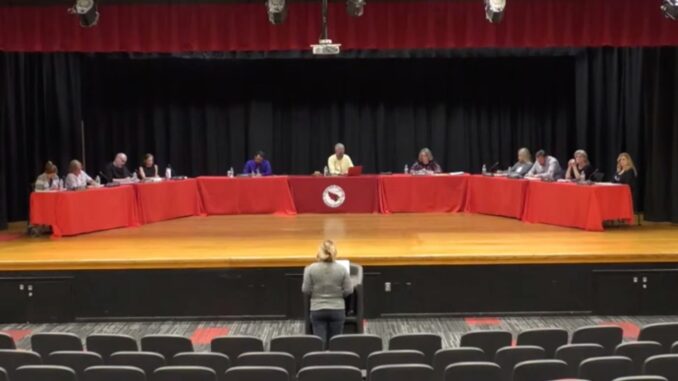
WESTWOOD REGIONAL—School trustees voted, 8-0, on July 19 to restructure the often contentious public comment period by allowing two three-minute opportunities for the public to comment: once on agenda items and on non-agenda items.
Previously, the board allowed the public one opportunity to comment for a maximum of five minutes. However, board and administration officials noted that one reason to split the public comment period into two was to allow the board to focus on its agenda, receive public input on that agenda, and then focus its work effort on the agenda items.
Recently, during occasionally abrasive and contentious public comment periods this year, Superintendent Jill Mortimer has come under fire from one or two individuals — one she threatened recently with a lawsuit over slanderous comments he allegedly made.
Several citizens have been argumentative and occasionally disruptive in pressing their concerns before trustees and the superintendent. A hot-button issue is the state’s mandatory health and physical education curriculum for grades K-12, which includes some new sex-education topics in lower and middle-school grades.
Mortimer has said that parents may opt their child out of any specific health lesson that they take to be morally or religiously offensive. The lessons may be viewed by parents via the district website, Mortimer said.
After a first public comment period that focuses on agenda-items, the new public participation policy allows a second public comment period between old and new business that will allow the public to raise concerns off the agenda.
Several residents criticized change, though trustees stressed that the two comment periods will now total six minutes, increasing the public’s comment time by one minute.
Depending on the meeting’s agenda and length, the time between the first and second comment periods could last hours.
Two revisions to amend Public Participation Policy 0167 were to change its third condition so that a participant “may speak more than once, up to three minutes, as long as all other speakers have spoken and time permits.”
The second condition revised was the “G” section, which was changed to be the new No. 6 in the policy and reads that the portion of the meeting during which the participation of the public is invited shall be limited to 60 minutes, “unless a motion to extend is made and approved by two-thirds of those present.”
Some residents asserted the changes were due to Mortimer wanting to limit certain speakers.
Not so, said Mortimer. She explained the time allowed now was longer and that she does not oppose any speakers, only repeated untruths about her.
“There is a difference between free speech and personal attack,” Mortimer replied to one resident who charged that the public comment changes appeared “personal” to her and advised the board to carefully consider any changes.
She noted the district has a public complaint and grievance policy, and a reporting mechanism online, that involve a committee of board members who meet with a resident not happy about the resolution of a problem.
“BOE meetings are meetings held in public, not meetings for the public,” said board president Frank Romano III. He emphasized that public input and feedback was vital to board functioning but that trustees need to focus on getting school board matters done when they meet.
He said he favored putting the possible extension of the one-hour public participation time limit into policy so that future boards can rely on policy, not past practice. “We’ve done it on many occasions, indeed, I’ve welcomed that.”
Romano also suggested that parents and residents follow the “chain of command” in bringing issues and problems to the appropriate personnel first, rather than presenting a situation to the superintendent at a public meeting.
If parents are unsatisfied after going through initial channels open to them to address school issues, then unresolved concerns and issues should be brought before the board, officials said.
